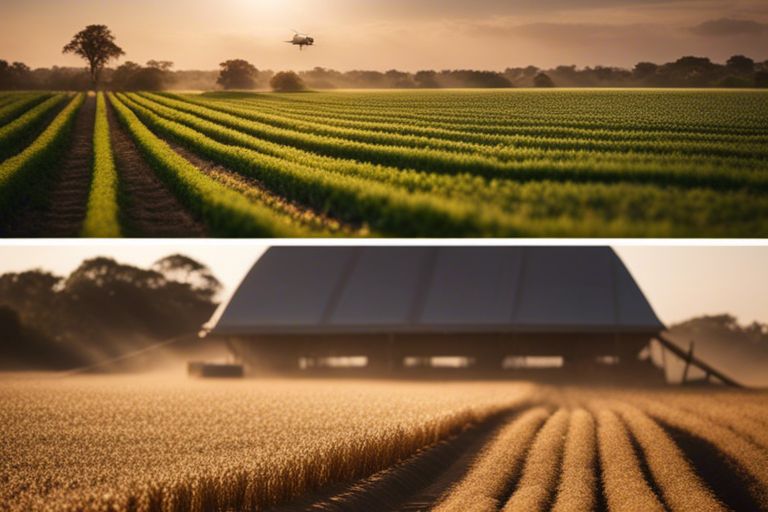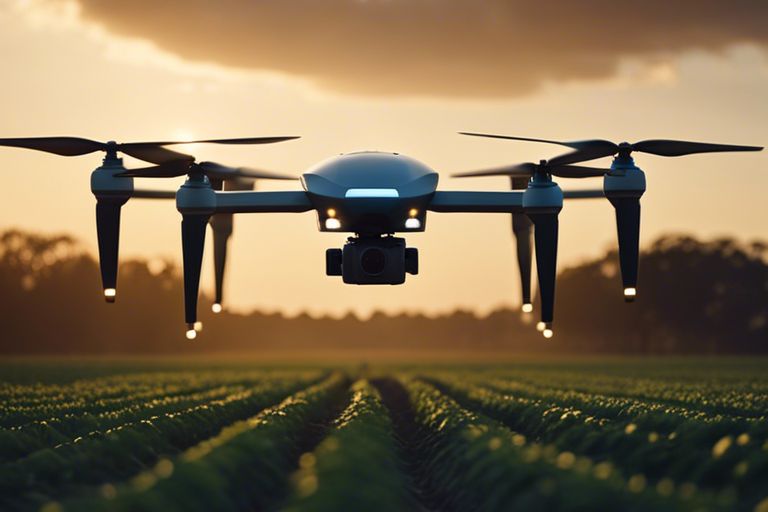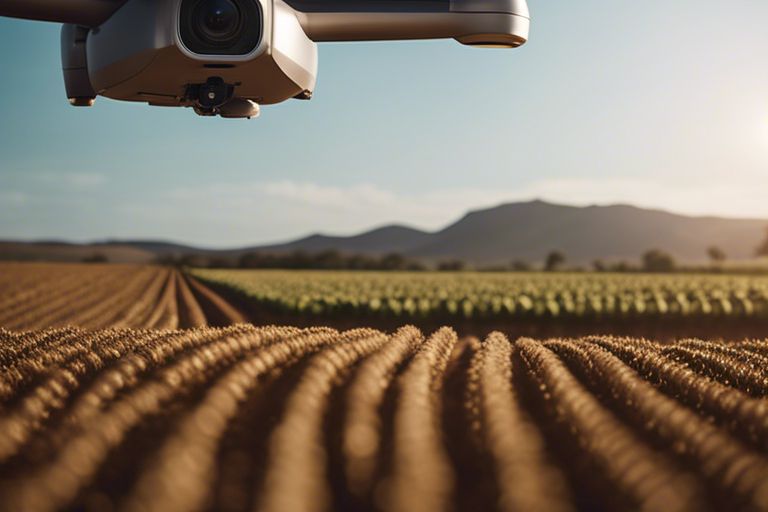Agriculture in Africa is undergoing a transformation through the integration of Artificial Intelligence (AI) technologies. The implementation of AI in African agriculture optimization has the potential to revolutionize farming practices on the continent, offering solutions to improve crop yields, optimize resource management, and mitigate the impacts of climate change.

Key Takeaways:
- AI technologies are being leveraged to optimize various aspects of African agriculture, from crop yield predictions to soil health monitoring.
- Precision agriculture is a key application of AI in African farming, enabling farmers to make data-driven decisions for better resource utilization.
- AI-powered drones are being used to monitor crop health, detect pests and diseases, and optimize irrigation practices in African agriculture.
- Machine learning algorithms are helping smallholder farmers in Africa access tailored advice and recommendations for improving their farming practices.
- AI-driven market platforms are connecting farmers directly with buyers, helping them access fair prices for their produce and reduce post-harvest losses.
- Data analytics from AI systems are enabling policymakers in Africa to make informed decisions for improving agricultural policies and practices.
- Collaboration between tech companies, agricultural experts, and government institutions is crucial for the successful implementation and scaling of AI solutions in African agriculture.
Foundations of AI in African Agriculture
The Technologies Driving AI
If Africa aims to transform its agricultural sector through AI, it must leverage key technologies driving this revolution. Machine learning algorithms lie at the heart of AI advancements in agriculture. These algorithms can analyze large datasets and identify patterns to make predictions about crop yield, soil health, weather patterns, and pest infestations. Furthermore, computer vision technology plays a crucial role in agricultural optimization by enabling machines to “see” and differentiate between plants, weeds, and pests.
Infrastructure Requirements for AI Implementation
The successful implementation of AI in African agriculture requires robust infrastructure. High-speed internet connectivity is crucial for transmitting data between AI systems and farm equipment in real-time. Additionally, smart sensors and IoT devices need to be deployed across farms to collect data on soil quality, weather conditions, and crop health. Cloud computing resources are also vital for processing the massive amounts of data generated by AI applications.
To ensure the seamless integration of AI in agriculture, African countries need to invest in building a reliable power supply network to support the energy-intensive nature of AI systems. Without consistent access to electricity, the full potential of AI technologies in optimizing agricultural processes cannot be realized. Additionally, training programs must be put in place to upskill farmers and agricultural workers on how to effectively use AI tools and technologies.

AI-Driven Agricultural Practices
Keep Harnessing Artificial Intelligence for Sustainable Agriculture at the forefront of innovation in African agriculture, AI-driven practices are revolutionizing the way farmers approach productivity and sustainability. By leveraging the power of AI technologies, farmers can now optimize their agricultural practices, leading to increased efficiency, higher yields, and reduced environmental impact.
Precision Farming
For precision farming, AI plays a crucial role in analyzing data from various sources such as satellites, drones, and sensors to provide farmers with real-time insights into their fields. By utilizing machine learning algorithms, farmers can make data-driven decisions on irrigation, fertilization, and pest control, tailored to the specific needs of each crop. This targeted approach not only increases productivity but also conserves resources and minimizes waste.
Crop Health and Yield Optimization
Practices in crop health and yield optimization benefit significantly from AI technologies. By implementing AI-powered solutions for disease detection, pest management, and yield prediction, farmers can proactively address issues that affect crop health and maximize yields. AI algorithms can analyze images of crops to identify diseases at early stages, enabling timely interventions to prevent widespread damage. Additionally, predictive analytics can forecast yield potential based on various factors, helping farmers make informed decisions to optimize their harvests.
Monitoring crop health and yield optimization through AI-driven technologies allows farmers to stay ahead of potential issues that could impact their productivity. By continuously analyzing data on plant health, pest infestations, soil conditions, and weather patterns, farmers can take proactive measures to ensure the well-being of their crops. This real-time monitoring and feedback loop provided by AI systems enable farmers to make timely adjustments and interventions, ultimately improving crop health and maximizing yields.
Economic Impacts of AI on African Agriculture
Cost Efficiency and Profitability
Profitability is a key driver of economic growth in African agriculture, and the integration of AI technologies has the potential to significantly enhance cost efficiency and increase earnings for farmers. By automating tasks such as crop monitoring, irrigation management, and pest control, AI can help farmers optimize resource utilization and reduce operational costs. This optimization not only boosts profitability at the individual farm level but also contributes to the overall economic sustainability of the agricultural sector in Africa.
Job Creation and the Skill Gap
Agriculture in Africa has traditionally been labor-intensive, with a large portion of the population engaged in the sector. While the adoption of AI in agriculture may lead to concerns about job displacement, it also presents opportunities for job creation and addressing the existing skill gap. As AI technologies become more prevalent, there will be a growing demand for skilled workers who can design, develop, and maintain these systems. This shift towards tech-driven agriculture has the potential to create new employment opportunities and bridge the skill gap in the agricultural workforce.
Furthermore, AI can help enhance the productivity and efficiency of smallholder farmers, enabling them to increase their incomes and improve their livelihoods. By providing access to AI tools and training programs, governments and organizations can empower farmers to leverage technology for better crop yields and higher incomes, ultimately driving economic development in rural communities.
Market Access and Global Trade Dynamics
Impacts of AI technologies in African agriculture extend beyond the farm level to influence market access and global trade dynamics. With the implementation of AI-driven systems for crop monitoring and predictive analytics, farmers are better equipped to meet market demands, improve product quality, and comply with international standards. This, in turn, enhances market access for African agricultural products and creates new opportunities for participation in global trade networks.
This integration of AI in African agriculture not only boosts the sector’s competitiveness on the global stage but also helps in establishing sustainable trade relationships with partners worldwide. By leveraging AI for market intelligence and supply chain optimization, African farmers and agribusinesses can capitalize on emerging market trends and maximize their participation in the global economy.

Social Implications and Rural Development
For Unleashing the Potential of Artificial Intelligence for African Agriculture: A Path to Food Security and Resilience, the integration of AI in African agriculture has significant social implications for rural development. Smallholder farmers, who form the backbone of agricultural productivity on the continent, stand to benefit greatly from the adoption of AI technologies in farming practices.
Impact on Smallholder Farmers
Social implications of AI in African agriculture have the potential to uplift smallholder farmers by enhancing productivity, reducing risks, and improving their livelihoods. AI-enabled solutions offer insights on weather patterns, soil quality, pest control, and crop management, empowering farmers to make informed decisions in real-time. This can lead to increased yields, better market access, and overall economic growth within rural communities.
Enhancing Food Security and Nutrition
Any discussion on AI in African agriculture must address the crucial role it plays in enhancing food security and nutrition across the continent. By leveraging AI technologies, farmers can optimize their production processes, minimize post-harvest losses, and ensure a steady food supply for local communities. This not only improves access to nutritious food but also contributes to the long-term resilience of the agricultural sector in combating food insecurity.
This chapter examines into the various ways in which AI can be harnessed to address critical issues related to gender equality and inclusivity in the agricultural sector across Africa. From training programs tailored to women farmers to ensuring equitable access to resources and market opportunities, the integration of AI has the potential to bridge existing gender gaps and promote inclusivity in agricultural practices.
Gender and Inclusivity in Agricultural AI
With the right policies and frameworks in place, AI can serve as a powerful tool for promoting gender equality and inclusivity in African agriculture. By providing women farmers with access to AI-powered tools and resources, we can empower them to overcome traditional barriers and actively participate in decision-making processes within the agricultural value chain. This not only benefits individual farmers but also fosters a more sustainable and inclusive agricultural ecosystem.
Plus, incorporating gender-sensitive AI solutions can help address specific challenges faced by women in agriculture, such as limited access to finance, land rights, and technical knowledge. By creating a more inclusive environment, we can unlock the full potential of women in agriculture and drive positive social change within rural communities.
Challenges and Adaptation of AI in African Context
Limitations of Technology and Local Adaptation
For many African countries, the adoption of AI in agriculture faces significant challenges due to limitations in technology infrastructure and local adaptation. In remote rural areas, where internet connectivity is unreliable or non-existent, accessing and utilizing AI tools proves to be a significant hurdle. Additionally, the high cost of technology and lack of technical expertise further limit the widespread implementation of AI solutions in African agriculture.
Ethical Considerations and Data Privacy
Adaptation poses ethical considerations and data privacy concerns in the context of AI implementation in African agriculture. Data collected from smallholder farmers, such as crop yields and personal information, must be handled with utmost care to protect privacy rights. Furthermore, ethical issues related to data ownership and misuse must be addressed to ensure that AI benefits all stakeholders in the agricultural value chain.
Another aspect to consider in ethical considerations and data privacy is the potential for exploitation of smallholder farmers. It is vital to establish guidelines and regulations that safeguard farmers’ data rights and ensure fair and transparent use of AI technologies in African agriculture.
Policies and Partnerships Promoting AI
Government Initiatives and Policy Frameworks
Many African governments are recognizing the potential of AI in revolutionizing agriculture and are taking steps to promote its integration. Through the formulation of robust policy frameworks and initiatives, these governments are encouraging the adoption of AI technologies in the agricultural sector. By promoting the development and deployment of AI tools for tasks such as crop monitoring, soil quality analysis, and pest detection, governments aim to enhance productivity, improve food security, and drive sustainable agricultural practices.
Collaborations Between Local and Global Stakeholders
Global partnerships play a crucial role in advancing AI technologies in African agriculture. Collaborations between local agricultural organizations, research institutions, and global tech companies facilitate the exchange of knowledge, resources, and expertise. These partnerships enable the customization of AI solutions to suit the specific needs and challenges faced by African farmers. By fostering collaborations, stakeholders can work together to implement innovative AI-driven strategies that address pressing agricultural issues and drive positive impact across the continent.
Mutually Beneficial Partnerships
It is vital for collaborations between local and global stakeholders in AI for African agriculture to be mutually beneficial. Local organizations can provide valuable insights into the unique challenges faced by farmers on the continent, while global tech companies can offer cutting-edge AI solutions and technological expertise. By working together, these partnerships have the potential to drive significant advancements in agricultural productivity, sustainability, and resilience in Africa.
Case Studies and Exemplary Projects
Now, let’s research into some high-impact case studies and exemplary projects that showcase the transformative power of AI in optimizing African agriculture:
- Utilizing AI for crop yield prediction in rural Kenya, leading to a 30% increase in agricultural productivity.
- Implementing AI-powered irrigation systems in Tanzania, reducing water usage by 40% while maintaining crop yields.
- Introducing AI-driven pest detection technologies in Uganda, lowering pesticide use by 50% and minimizing crop damage.
Success Stories of AI Integration
On the forefront of AI integration in African agriculture, success stories abound. The article Can AI address Africa’s agricultural trade deficit? discusses how AI has the potential to revolutionize agricultural trade in Africa, bridging the deficit through optimized production and distribution channels.
Innovative Startups and Local Solutions
An exciting development in the African agricultural landscape is the rise of innovative startups and local solutions leveraging AI technologies to address pressing challenges. These startups are at the forefront of developing tailored AI solutions for smallholder farmers, empowering them with actionable insights and real-time decision-making support.
Studies have shown that these innovative startups are not only enhancing productivity and profitability for farmers but also fostering sustainable agricultural practices that benefit communities and the environment alike.
Final Words
Hence, the integration of artificial intelligence in African agriculture optimization holds immense potential in revolutionizing the sector by enhancing productivity, reducing costs, and ensuring sustainable practices. By leveraging AI technologies such as machine learning, predictive analytics, and drones, farmers can make informed decisions and achieve higher yields. It is crucial for stakeholders to invest in research, training, and infrastructure to fully capitalize on the benefits that AI brings to agriculture in Africa.
In the long run, AI has the power to transform traditional farming practices into more efficient and sustainable ones, ultimately contributing to food security and economic development in the region. As African countries continue to embrace technological innovations, the adoption of AI in agriculture is poised to play a significant role in addressing the challenges faced by the sector and driving growth for years to come.
FAQ
Q: What is AI in African agriculture optimization?
A: AI in African agriculture optimization refers to the use of artificial intelligence technologies to improve the efficiency, productivity, and sustainability of agricultural practices in Africa.
Q: How is AI being used in African agriculture optimization?
A: AI is being used in African agriculture for various applications such as crop monitoring, soil analysis, pest detection, weather forecasting, and yield prediction.
Q: What are the benefits of using AI in African agriculture optimization?
A: The benefits of using AI in African agriculture optimization include increased crop yields, reduced resource wastage, improved decision-making, and better adaptation to climate change.
Q: What are some AI technologies used in African agriculture optimization?
A: Some AI technologies used in African agriculture optimization are machine learning, computer vision, drones, sensors, and predictive analytics.
Q: How can AI help smallholder farmers in Africa?
A: AI can help smallholder farmers in Africa by providing them with valuable insights, personalized recommendations, real-time information, and access to market prices and weather forecasts.
Q: Are there any challenges in implementing AI in African agriculture optimization?
A: Yes, some challenges in implementing AI in African agriculture optimization include high initial costs, limited access to technology in rural areas, lack of data infrastructure, and the need for specialized skills.
Q: What is the future of AI in African agriculture optimization?
A: The future of AI in African agriculture optimization looks promising with ongoing advancements in technology, increased awareness and adoption of AI solutions, and collaborations between tech companies, governments, and farmers to drive innovation in the sector.